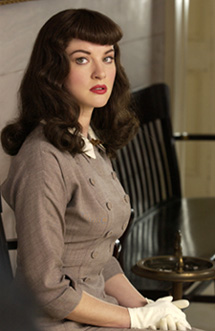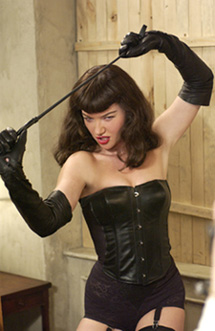|
Reviews of Recent Independent, Foreign, & Documentary Films in Theaters and DVD/Home Video 
Directed by: Mary Harron. Produced by: Pamela Koffler, Katie Roumel & Christine Vachon. Written by: Mary Harron & Guinevere Turner. Director of Photography: Mott Hupfel. Edited by: Tricia Cooke. Music by: Mark Suozzo. Released by: Picturehouse/HBO Films. Country of Origin: USA. 91 min. Rated: R. With: Gretchen Mol, Chris Bauer, Jared Harris, David Strathairn & Lili Taylor.
As lightweight as a silk negligee, Mary Harron’s homage to the “pin-up queen of the universe” Bettie Page (Gretchen Mol) never fully convinces that the model was more than a ’50 pop culture footnote. The opening prologue sets the tone: a Times Square bookstore shelved with such skin mags as Wink and Titter is raided by the FBI for stockpiling kink – photos of Page in laced black leather boots. This introduction is an even more succinct tribute to First Amendment rights than Good Night, and Good Luck. Then the film reenacts congressional hearings on pornography, with the sanctimonious Senator Estes Kefauver (David Strathairn) presiding. Among those called to testify is one Bettie Page.
What follows is the rise of a small-town girl from the Bible Belt who becomes the star of kitschy 16mm S/M films. In no time at all, Page metamorphoses from a flirtatious teenager to college coed, then a married and divorced woman within a minute. An episode where a date turns into a sexual assault in the backwoods is the darkest note stuck in an otherwise breezy portrayal. After that, it’s no wonder she heads for the Big Apple to become an actress. To pay the rent, she poses for cheesecake photos. One gig leads to another, and seeing no harm in it, she looses her inhibitions and then her clothes.
For a bio pic with such a linear narrative, there are a few gaps. Mary Harron and Guinevere Turner’s screenplay barely hints at Page’s internal conflict. She’s a main character who doesn’t reflect. In the end when she has become an Evangelical preacher, Page doesn’t deny to a fan she was once a model. Declaring she morally did nothing wrong in posing nude, she uses Adam and Eve as an example, “When they sinned, they put on clothes.” Yet, there is no precise point where Page even imagines she has sinned, nor is a connection made between the earlier sexual abuse, her provocative profession and her decision to quit show business.
Instead, her boyfriend, another acting student, forbids her to pose nude again, much to her disappointment. And it becomes obvious to her that she was only invited to an audition because of her curiosity value when she is referred to by the auditor as the notorious Bettie Page. Yet it’s not for nothing that she’s auditioning for Tennessee William’s Summer and Smoke, a play about another Southern woman’s conflict between the urges of the body and her religious upbringing. It’s not quite believable that Page would care what others would say based on her naïve pride. While in bondage gear, she declares to a client that God gave her the talent to pose for pictures. And at the start of her nudist career, she willingly takes it all off, at barely the suggestion of an awestruck photographer. She’s literally a naked babe in the woods, at home in the raw and in her convictions. However, the puritan/vixen dichotomy only carries the film so far. As Page sheds her clothes, so does the film an overarching conflict.
Kent Turner
|

